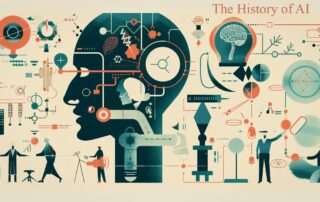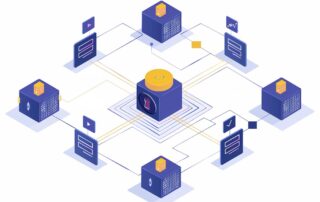
Learn AI for Business Overview
As Artificial Intelligence (AI) continues to reshape industries and revolutionize everyday life, gaining knowledge and skills in this field opens up endless opportunities for innovation, problem-solving, and career growth.
Learning AI for business isn’t just about keeping up with the latest technology; it’s about harnessing a powerful tool that can transform how companies operate, make decisions, and deliver value to customers. Whether you’re a business leader, manager, or entrepreneur, understanding AI’s potential in the business context is crucial for staying ahead in the rapidly evolving market.
AI is reshaping business operations across industries by automating processes, optimizing supply chains, enhancing customer experiences, and driving innovation. For business professionals, learning AI means acquiring the skills to integrate AI technologies into your organization’s strategy effectively. This includes understanding how to implement AI-driven solutions that can analyze data, predict trends, and automate decision-making processes, leading to more informed and agile business operations.
One of the key areas where Learning AI for business is making a significant impact is in data analytics. By learning AI, business professionals can better harness big data to gain actionable insights. Machine learning models can sift through vast amounts of data to identify patterns and trends that would be impossible for humans to detect. This capability is particularly valuable for tasks such as market forecasting, customer segmentation, and risk management, where precision and accuracy are paramount.
Another critical aspect of AI for business is improving customer interactions. Through AI-powered chatbots, personalized marketing, and recommendation systems, companies can enhance customer engagement and satisfaction. Learning how these AI technologies work enables business professionals to create more effective strategies that resonate with their target audience, leading to increased customer loyalty and sales.
Moreover, understanding AI’s role in business innovation is essential. AI is not just about improving existing processes; it’s about creating new business models and opportunities. By learning AI, you can identify areas within your industry where AI can be a game-changer, whether it’s through developing new products, optimizing service delivery, or exploring entirely new markets.
The Benefits of AI for Business
Artificial Intelligence (AI) has become a game-changer for businesses across various industries, providing innovative ways to optimize operations, enhance customer experiences, and drive revenue growth. Here’s a breakdown of the core benefits AI offers to businesses:
1. Automation of Repetitive Tasks
AI-powered automation tools can handle mundane, repetitive tasks such as data entry, customer support, and inventory management. This leads to increased efficiency, reduced human error, and frees up employees to focus on higher-level strategic work.
2. Improved Decision-Making
AI algorithms can analyze vast amounts of data in real-time, uncovering patterns and insights that would be impossible for humans to detect. This helps businesses make more informed decisions based on data-driven insights, whether it’s optimizing pricing, forecasting trends, or improving supply chain management.
3. Enhanced Customer Experience
With AI-powered chatbots and virtual assistants, businesses can offer 24/7 customer support, resolve issues faster, and provide personalized recommendations based on customer preferences. AI enables hyper-personalization by tailoring marketing messages and offers to individual customers, enhancing satisfaction and loyalty.
4. Cost Savings
By automating processes, AI helps businesses cut operational costs. For example, predictive maintenance in manufacturing can prevent costly equipment breakdowns, while AI-driven demand forecasting reduces inventory holding costs by optimizing stock levels.
5. Increased Productivity
AI tools can augment human capabilities, speeding up processes like data analysis, content creation, and project management. This enables teams to complete tasks faster and more accurately, significantly boosting productivity.
6. Data Security
AI systems can detect unusual patterns in network traffic, helping businesses identify potential security threats in real-time. AI-driven cybersecurity solutions improve the ability to prevent, detect, and respond to attacks, safeguarding sensitive business information.
7. Competitive Advantage
Businesses that leverage AI are better equipped to innovate and adapt to market changes. AI helps companies stay ahead of competitors by offering new services, improving product quality, and optimizing marketing strategies through advanced analytics.
8. Scalability
AI enables businesses to scale their operations more easily without the need for a proportional increase in labor. For instance, AI-driven customer service platforms can handle an increasing volume of queries without requiring additional staff, making growth more sustainable.
9. Enhanced Marketing Strategies
AI-driven analytics help businesses understand customer behavior at a granular level. AI tools can optimize ad targeting, content distribution, and campaign performance, ensuring marketing resources are used efficiently and with higher ROI.
10. Innovation and Product Development
AI can assist in research and development by analyzing market trends, customer feedback, and industry innovations. Businesses can create products that align more closely with consumer needs, bringing innovations to market faster and more effectively.
For business leaders, Learning AI for business also involves navigating the ethical and regulatory landscape. As AI becomes more integrated into business operations, understanding the implications of AI on privacy, security, and ethical practices is vital to ensure responsible and sustainable AI adoption.
![]()






























